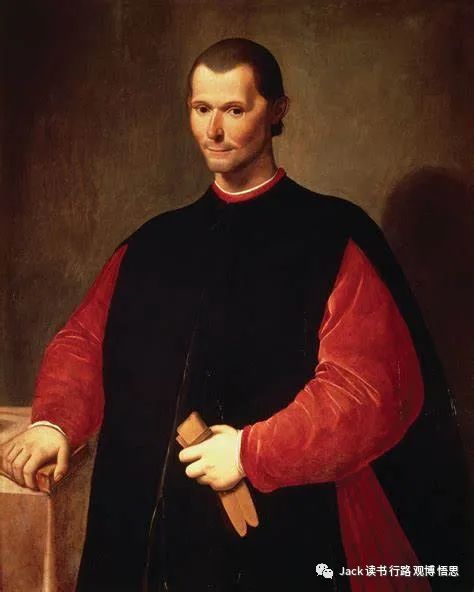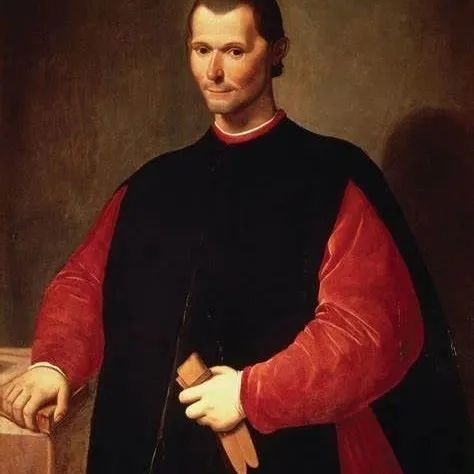Read History with Jack 40 - Breaking Moral Rules
From the past to the present, we have always tried to create moral rules to provide guidance for our daily behaviors. Whether it is in schools, in workplaces, or governments, these rules are arguably crucial for the well-being of every component of a state or country. However, especially in politics, these rules have been broken continuously throughout history to achieve some goal, be it personal or on the state perspective. The question about whether moral rules can be broken to achieve such goals, and whether the act of doing so would bring some good, has been debated for hundreds and even thousands of years. From my point of view, I attest to the relatively modern views first proposed by the Italian political scientist Machiavelli and that people are justified in many cases to violate moral rules if that leads to accomplishments that are beneficial for the state as a whole.

(Niccolo Machiavelli)
In Machiavelli’s masterpiece The Prince, he successfully looked at politics from a different angle and lens in comparison to his predecessors, such as Aristotle or Aquinas. Machiavelli claimed that people must think about politics in terms of politics itself and think in a realistic and piercing manner. In his book, Machiavelli argued that when a country is newly formed, when a politician or ruler chooses between being loved by his or her subjects or being feared by them, that ruler should choose the latter before the former. In other words, deciding between being a hardhearted tyrant who breaks many moral rules but keeps his or her realm firmly under control and a softhearted ruler who adheres to those rules constantly but risks splitting his realm up, a person should always keep to the tyrant. This is because compared with losing control over a vast realm and millions of people, the crimes committed to hold it up seems to be trivial and even unimportant. Additionally, Machiavelli found out that for a new monarch or politician, being tricky and cunning is more reliable than being honest and keeping to the rules. A governor must sometimes simultaneously be both violent and deceptive. Only through this way can he or she avoid stepping into lethal traps like a fox while defend from the attacks of other politicians or the crowd, just like how a lion defends itself from hyenas. Based on this, Machiavelli argued that breaking moral rules is acceptable if the action is done for the greater good of the country in political terms.
Looking across history, there are many cases that suggest that politicians have broken those moral rules to accomplish some grander goal for the country’s politics or nation. For example, Julius Caesar is renowned for his tough and unforgiving mentality. Throughout his political career, he undoubtedly broke many moral rules. For example, during his conquest of Gaul, he is estimated to kill at least 1,430,000 Celts and Germans in combat. When the Roman Senate ordered Caesar to step down from his military command and return to Rome, he openly defied it and marched towards Rome at the head of his army, starting a civil war which, he eventually won. Caesar certainly was not a hero to be admired morally. However, his unrelatedness and his resolute played a major role in keeping the Roman realm together despite constant mayhem within when the Republic collapsed and the Empire was built up. Without him, the Romans could not have been able to construct such a brilliant and breathtaking empire that spanned three continents at its heyday. From this example, we can see that sometimes, breaking moral rules can be crucial for the general well-being and final success of the state. The sacrifices of having a torn-apart empire far outweighs the sacrifices of violating those rules.
Another example is Emperor Qin Shihuang. He has been always known as a brutal tyrant. During his reign, bloodshed was common and in profuse numbers, and his famous decision of burning books and burying Confucian scholars alive have been notoriously passed down from generation to generation. Obviously, during the process of vanquishing the other six kingdoms, Emperor Qin broke countless amounts of moral rules. However, I think, that his contributions of unifying China for the first time in history and his other significant decisions that followed do deserve more credit. Without him, it might still be uncertain whether China would be unified in the passing of time. Emperor Qin’s emphasis on the unification of the entire Chinese realm, although in a very macabre and costly fashion, has proven to be everlasting and crucial for the success of China today. Thus, the ramifications from breaking those moral codes are far less significant than the boon of keep China as a whole.
Overall, from the above examples and explanations, I believe that moral rules can be violated to achieve some public good. From the past to the present, various politicians, and people who we now consider as heroes or deserve to be looked up to have sacrificed the interests of some for the greater interest of others. This is not to say that moral rules are completely useless, and we can choose not to adhere to. Those codes are imperative for the general well-being of society. But in a dangerous or important period of time historically, breaking such rules can help to bring peace and prosperity to the nation. At last, a crucial question still remains: What is the boundary of breaking moral rules? That has been one discussed for a long time.
从过去到现在,我们总是试图建立道德规则,为我们的日常行为提供指导。无论是在学校、工作场所还是政府,这些规则可以说对一个国家或民族的每个组成部分的繁荣都至关重要。然而,特别是在政治方面,无论是个人还是国家的角度,这些规则在历史上不断被打破,以实现一些目标。关于是否可以打破道德规则来实现这些目标,以及这样做的行为是否会带来一些好处,这个问题已经被辩论了几百年甚至几千年。从我的观点来看,我赞同意大利政治学家马基雅维利首先提出的相对现代的观点,在特定情况下可以打破道德规则,如果这能带来对社会有益的成就。

(马基雅维利)
在马基雅维利的代表作《君主论》中,相比于他的前辈亚里士多德或者阿奎纳,他成功地从一个不同的视角来看待政治。马基雅维利声称,人们必须从政治本身的角度来思考政治,并以现实和有时刺耳的方式进行思考。马基雅维利在他的书中论辩,当一个国家刚成立时,当一个政治家或统治者在被臣民爱戴或被臣民惧怕之间做出选择时,这个统治者应该选择后者。换句话说,在成为一个打破许多道德规则但能牢牢控制其王国的铁石心肠的“暴君”和一个不断遵守这些规则但有可能使其王国分裂的软心肠的统治者之间做出决定,一个人应该永远保持“暴君”的地位。这是因为,与失去对一个庞大的王国和数百万人的控制相比,为撑起这个王国而犯下的罪行似乎是微不足道的,甚至是不重要的。此外,马基雅维利发现,对于一个新的君主或政治家来说,诡计多端和狡猾比诚实和遵守规则更可靠。一个统治者有时必须同时具有暴力和欺骗性。只有通过这种方式,他(她)才能像狐狸一样避免踏入致命的陷阱,同时抵御其他政治家或人群的攻击,就像狮子抵御鬣狗一样。基于此,马基雅维利认为,如果打破道德规则的行为是为了国家在政治上的更大利益,那么这种行为是可以接受的。
纵观历史,有许多案例表明,政治家在打破了一些道德规则的时候,可以在更广泛的角度完成一些更有利于国家与民族的政治目标。例如,尤里斯-凯撒以其强硬与铁石心肠而闻名。在他的政治生涯中,他无疑打破了许多道德规则。例如,在他征服高卢的过程中,估计他在战斗中至少杀死了143万凯尔特人和日耳曼人。当罗马元老院命令凯撒卸下军事指挥权,返回罗马时,他公开违抗元老院的命令,率领军队向罗马进发,引发了一场内战,而他最终赢得了这场战争。恺撒当然不是一个在道德上十分值得敬佩的英雄。然而,在共和国崩溃和帝国建立时,尽管内部不断发生混乱,但他的独立性和他的坚决性在保持罗马帝国的团结方面发挥了重要作用。没有他,罗马人不可能在全盛时期建造出如此辉煌和令人惊叹的,横跨三大洲的帝国。从这个例子中,我们可以看到,有时,打破道德规则对国家的总体福祉和最终成功至关重要。拥有一个四分五裂的帝国的代价远远超过了违反这些规则的代价。
另一个例子是秦始皇。他一直被称为是一个残酷的暴君。在他的统治期间,流血事件屡见不鲜,而他著名的焚书坑儒的决定也是代代相传,臭名昭著。显然,在征服其他六国的过程中,秦始皇打破了无数的道德规则。然而,我认为,他在历史上第一次统一中国的贡献以及他随后做出的其他重大决定确实值得更多的赞扬。如果没有他,中国是否会在时间的流逝中实现统一,可能还是个未知的问题。秦始皇对整个中国的统一的信仰已被证明是永恒的,对今天中国的成功至关重要。因此,打破这些道德规则所带来的不利的结果相比于统一中国,结束战乱所带来的巨大福祉是微不足道的。
总的来说,从以上的例子和解释中,我相信在特定时期,道德规则可以被打破,以实现一些公共利益。从过去到现在,各种政治家,以及我们现在认为是英雄或值得仰视的人,都为了国家的更大利益而牺牲了一些人的利益。这并不是说道德规则完全无用,我们可以选择不遵守。这些准则对于社会的普遍福祉来说是必须的,但在历史上一个危险或重要的时期,打破这种规则可以帮助国家与民族从整体上带来和平与繁荣。然而,打破道德规则的界限在哪里却仍是人们值得永远讨论的主题。
- 本文标签: 原创
- 本文链接: http://www.jack-utopia.cn//article/431
- 版权声明: 本文由Jack原创发布,转载请遵循《署名-非商业性使用-相同方式共享 4.0 国际 (CC BY-NC-SA 4.0)》许可协议授权










